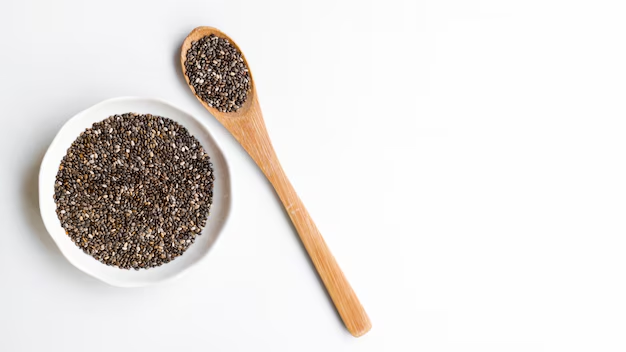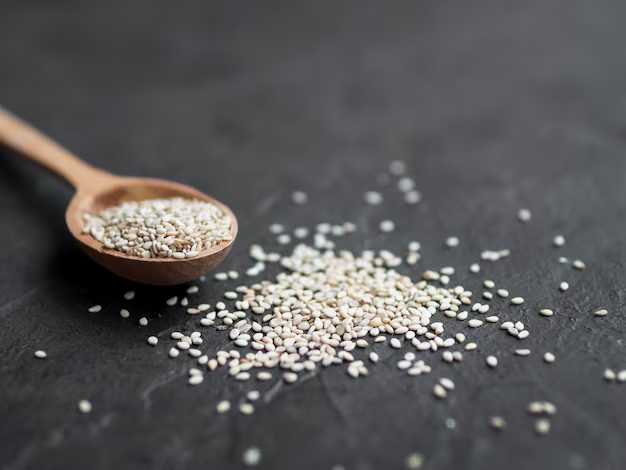Sesame seeds are tiny but mighty when it comes to nutrition and versatility. These seeds have been used in global cuisines and traditional medicine for centuries. Whether sprinkled on top of dishes or ground into a flavorful paste, sesame seeds offer remarkable health benefits. But are sesame seeds healthy? This article delves into their nutritional profile, potential health benefits, and best ways to enjoy them while staying mindful of possible side effects.
Sesame Seeds Nutrition: A Nutritional Powerhouse
Sesame seeds pack a powerful nutritional punch in a small package. They are rich in essential nutrients, making them a valuable addition to any diet. These seeds provide a balanced mix of macronutrients and vital micronutrients.
Sesame Seeds’ Macronutrient Profile
Sesame seeds are calorie-dense and nutrient-rich. They contain healthy fats, plant-based protein, and carbohydrates. Here’s a breakdown of their macronutrient composition:
- Calories: A tablespoon contains approximately 52 calories.
- Protein: They are an excellent plant-based protein source, with around 1.6 grams per tablespoon.
- Fats: Rich in healthy unsaturated fats, including omega-6 fatty acids.
- Carbohydrates: They contain a small amount of carbohydrates, mainly fiber.
Sesame Seeds Protein Content: A Plant-Based Protein Source
For vegetarians and vegans, sesame seeds offer a valuable source of protein. They also contain essential amino acids like methionine and tryptophan, which support muscle repair and overall health. Incorporating sesame seeds into your meals can help meet your daily protein needs without relying on animal products.
Are Sesame Seeds Good for Weight Loss?
Sesame seeds can aid weight loss due to their high fiber content. Fiber helps you feel full longer, reducing the urge to snack unnecessarily. Additionally, the healthy fats in sesame seeds can curb cravings and provide sustained energy throughout the day.
Related to Read: Are Chia Seeds Healthy? Exploring Their Benefits
Health Benefits of Sesame Seeds
Sesame seeds are tiny, nutty-flavored seeds with a wealth of nutrients packed into their small size. They have been cultivated for thousands of years and are prized in both culinary and medicinal contexts worldwide. These seeds are rich in essential nutrients, antioxidants, and compounds that contribute to overall health. Here’s a detailed look at the numerous health benefits sesame seeds offer.

1. Rich Source of Essential Nutrients
Sesame seeds are a nutritional powerhouse. They provide a variety of vitamins and minerals essential for maintaining good health.
- Calcium: Promotes strong bones and teeth.
- Magnesium: Supports muscle and nerve function.
- Iron: Aids in oxygen transport and energy production.
- Vitamin B Complex: Improves brain health and energy metabolism.
2. Heart Health
The healthy fats in sesame seeds, especially polyunsaturated fatty acids (PUFAs), contribute to cardiovascular well-being.
- Lower LDL Cholesterol: Sesame seeds contain lignans and phytosterols, which can reduce levels of “bad” LDL cholesterol.
- Rich in Antioxidants: Compounds like sesamin and sesamol protect the heart by reducing oxidative stress.
- Control Blood Pressure: The magnesium in sesame seeds helps lower blood pressure naturally.
3. Bone Strength
Sesame seeds are an excellent source of calcium, magnesium, and phosphorus, all of which are crucial for maintaining healthy bones.
- Beneficial for preventing osteoporosis, especially in postmenopausal women.
- Regular consumption supports bone density and reduces the risk of fractures.
4. Improved Digestion
The high fiber content in sesame seeds aids digestion and promotes gut health.
- Relieves Constipation: Fiber improves bowel regularity.
- Supports a Healthy Gut Microbiome: Encourages the growth of beneficial bacteria in the digestive system.
5. Boosts Immune Function
Sesame seeds contain zinc and selenium, which are essential for maintaining a strong immune system.
- Helps the body fight infections.
- Promotes the production of immune cells.
6. Benefits for Skin and Hair
Sesame seeds are a natural beauty booster thanks to their nutrient content.
- Healthy Skin: Vitamin E and antioxidants protect skin from aging and damage caused by free radicals.
- Hair Growth: The nutrients in sesame seeds, particularly iron and zinc, strengthen hair follicles and encourage growth.
7. Blood Sugar Control
Sesame seeds have a low glycemic index, making them a suitable choice for individuals with diabetes.
- Magnesium and lignans help regulate blood sugar levels.
- Can improve insulin sensitivity over time.
8. Anti-Inflammatory Properties
Sesame seeds contain sesamin, a lignan with anti-inflammatory effects.
- Helps reduce chronic inflammation linked to conditions like arthritis and cardiovascular diseases.
- Can alleviate joint pain and improve mobility in those with inflammatory disorders.
9. Hormonal Balance
Sesame seeds are rich in phytoestrogens, plant-based compounds that mimic estrogen in the body.
- Beneficial for women during menopause as they may help regulate hormonal fluctuations.
- Supports overall reproductive health.
10. Mental Well-Being
Nutrients in sesame seeds contribute to improved brain function and mental health.
- Tryptophan: An amino acid in sesame seeds helps produce serotonin, which enhances mood and promotes relaxation.
- Thiamine and Niacin: Improve nerve function and reduce stress.
11. Weight Management
Despite being calorie-dense, sesame seeds can aid in weight management when consumed in moderation.
- High fiber content keeps you full for longer and reduces overeating.
- Healthy fats provide sustained energy and curb cravings.
12. Supports Detoxification
Sesame seeds help detoxify the body by supporting liver health.
- Rich in antioxidants that help flush toxins.
- Sesamin promotes liver function and protects it from oxidative damage.
Related to Read: Are Sunflower Seeds Healthy? Exploring Their Nutritional Benefits
How to Eat Sesame Seeds
Sesame seeds are incredibly versatile and easy to incorporate into meals. Their nutty flavor and crunchy texture make them a popular choice for a wide range of dishes.

Ways to Incorporate Sesame Seeds Into Your Diet
- Toppings: Sprinkle toasted sesame seeds on salads, soups, or rice dishes for added texture and flavor.
- Smoothies: Blend sesame seeds into your smoothies for a boost of nutrients and a nutty taste.
- Tahini: Use sesame seed paste (tahini) in dressings, dips, or as a spread for bread and vegetables.
- Sesame Oil: Drizzle sesame oil over stir-fried vegetables or use it as a marinade for an aromatic kick.
Tips for Maximizing Nutrient Absorption
- Toast the Seeds: Lightly toasting sesame seeds enhances their flavor and makes it easier for the body to absorb their nutrients.
- Grind Them: Grinding the seeds into a paste or powder improves digestibility.
- Combine with Vitamin C-Rich Foods: Pair sesame seeds with fruits or vegetables high in vitamin C to enhance iron absorption.
Side Effects of Sesame Seeds
While sesame seeds are generally safe, they may cause side effects in certain individuals. Being aware of these potential issues is important.
Possible Allergic Reactions and Sensitivities
Sesame seeds are a common allergen. Symptoms of an allergic reaction may include:
- Skin rash or hives
- Difficulty breathing
- Stomach upset or diarrhea
If you suspect an allergy, consult a healthcare provider before consuming sesame seeds.
Moderation Advice Due to High-Calorie Density
Despite their health benefits, sesame seeds are calorie-dense. Overeating can lead to unwanted weight gain. A tablespoon or two per day is usually sufficient for most people.
Sesame Seeds and Specific Health Goals
Sesame seeds can support specific health goals, from managing blood sugar levels to improving bone health.
Are Sesame Seeds Good for You If You Have Diabetes?
Sesame seeds may help stabilize blood sugar levels. They have a low glycemic index, meaning they cause a slower rise in blood sugar compared to high-carb foods. Additionally, magnesium in sesame seeds plays a role in improving insulin sensitivity.
Sesame Seeds for Bone Health: Calcium and Magnesium Benefits
Sesame seeds are rich in calcium and magnesium, two minerals essential for strong bones. A tablespoon of sesame seeds provides about 9% of the daily recommended calcium intake. Regular consumption may reduce the risk of osteoporosis, especially in postmenopausal women.
FAQs About Sesame Seeds
1. Are sesame seeds good for weight loss?
Yes, they support weight loss due to their fiber and healthy fat content, which help control hunger and cravings.
2. Can you eat sesame seeds every day?
Yes, but moderation is key. Around 1–2 tablespoons daily is sufficient for most people.
3. Are sesame seeds good for cholesterol?
Yes, they contain lignans and phytosterols, which help reduce LDL (bad cholesterol) levels.
4. Do sesame seeds have any side effects?
Possible side effects include allergic reactions and weight gain if consumed in excess.
Conclusion
Sesame seeds are undeniably healthy. They are rich in nutrients, versatile in cooking, and provide numerous health benefits. From improving heart and bone health to aiding weight management, sesame seeds can be a valuable addition to your diet. Just remember to enjoy them in moderation to avoid potential side effects. So, sprinkle some sesame seeds on your meals and reap their incredible health benefits!

